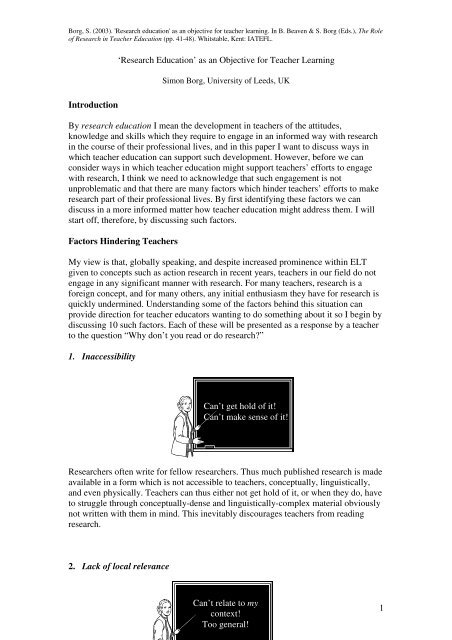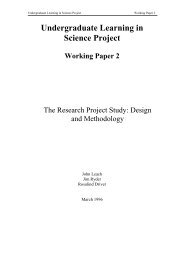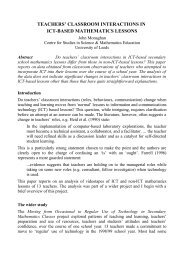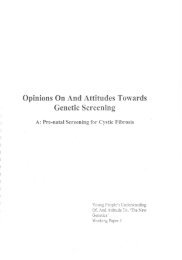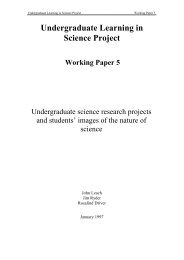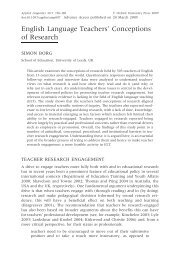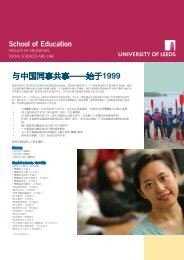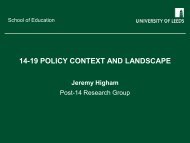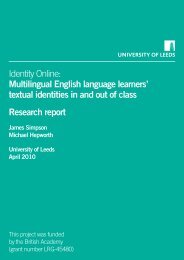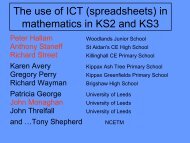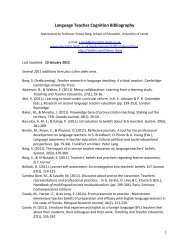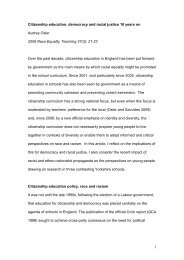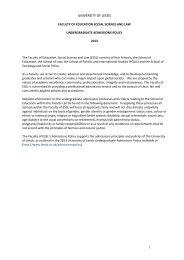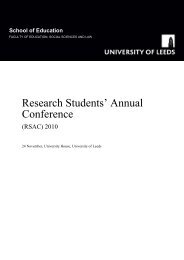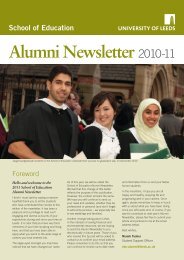1 'Research Education' as an Objective for Teacher Learning ...
1 'Research Education' as an Objective for Teacher Learning ...
1 'Research Education' as an Objective for Teacher Learning ...
Create successful ePaper yourself
Turn your PDF publications into a flip-book with our unique Google optimized e-Paper software.
Borg, S. (2003). <strong>'Research</strong> education' <strong>as</strong> <strong>an</strong> objective <strong>for</strong> teacher learning. In B. Beaven & S. Borg (Eds.), The Role<br />
of Research in <strong>Teacher</strong> Education (pp. 41-48). Whitstable, Kent: IATEFL.<br />
‘Research Education’ <strong>as</strong> <strong>an</strong> <strong>Objective</strong> <strong>for</strong> <strong>Teacher</strong> <strong>Learning</strong><br />
Simon Borg, University of Leeds, UK<br />
Introduction<br />
By research education I me<strong>an</strong> the development in teachers of the attitudes,<br />
knowledge <strong>an</strong>d skills which they require to engage in <strong>an</strong> in<strong>for</strong>med way with research<br />
in the course of their professional lives, <strong>an</strong>d in this paper I w<strong>an</strong>t to discuss ways in<br />
which teacher education c<strong>an</strong> support such development. However, be<strong>for</strong>e we c<strong>an</strong><br />
consider ways in which teacher education might support teachers’ ef<strong>for</strong>ts to engage<br />
with research, I think we need to acknowledge that such engagement is not<br />
unproblematic <strong>an</strong>d that there are m<strong>an</strong>y factors which hinder teachers’ ef<strong>for</strong>ts to make<br />
research part of their professional lives. By first identifying these factors we c<strong>an</strong><br />
discuss in a more in<strong>for</strong>med matter how teacher education might address them. I will<br />
start off, there<strong>for</strong>e, by discussing such factors.<br />
Factors Hindering <strong>Teacher</strong>s<br />
My view is that, globally speaking, <strong>an</strong>d despite incre<strong>as</strong>ed prominence within ELT<br />
given to concepts such <strong>as</strong> action research in recent years, teachers in our field do not<br />
engage in <strong>an</strong>y signific<strong>an</strong>t m<strong>an</strong>ner with research. For m<strong>an</strong>y teachers, research is a<br />
<strong>for</strong>eign concept, <strong>an</strong>d <strong>for</strong> m<strong>an</strong>y others, <strong>an</strong>y initial enthusi<strong>as</strong>m they have <strong>for</strong> research is<br />
quickly undermined. Underst<strong>an</strong>ding some of the factors behind this situation c<strong>an</strong><br />
provide direction <strong>for</strong> teacher educators w<strong>an</strong>ting to do something about it so I begin by<br />
discussing 10 such factors. Each of these will be presented <strong>as</strong> a response by a teacher<br />
to the question “Why don’t you read or do research?”<br />
1. Inaccessibility<br />
C<strong>an</strong>’t get hold of it!<br />
C<strong>an</strong>’t make sense of it!<br />
Researchers often write <strong>for</strong> fellow researchers. Thus much published research is made<br />
available in a <strong>for</strong>m which is not accessible to teachers, conceptually, linguistically,<br />
<strong>an</strong>d even physically. <strong>Teacher</strong>s c<strong>an</strong> thus either not get hold of it, or when they do, have<br />
to struggle through conceptually-dense <strong>an</strong>d linguistically-complex material obviously<br />
not written with them in mind. This inevitably discourages teachers from reading<br />
research.<br />
2. Lack of local relev<strong>an</strong>ce<br />
C<strong>an</strong>’t relate to my<br />
context!<br />
Too general!<br />
1
Borg, S. (2003). <strong>'Research</strong> education' <strong>as</strong> <strong>an</strong> objective <strong>for</strong> teacher learning. In B. Beaven & S. Borg (Eds.), The Role<br />
of Research in <strong>Teacher</strong> Education (pp. 41-48). Whitstable, Kent: IATEFL.<br />
There is some evidence to suggest that teachers are most convinced to adopt new<br />
practices by local knowledge - underst<strong>an</strong>dings of teaching emerging from their own or<br />
their colleagues’ experience. Such knowledge h<strong>as</strong> a number of characteristics. It is:<br />
specific<br />
contextualised<br />
observable<br />
testable.<br />
This kind of knowledge contr<strong>as</strong>ts with the knowledge often generated <strong>an</strong>d presented<br />
by researchers, which, in its attempt to be generalizable, lacks specificity <strong>an</strong>d does not<br />
enable teachers to relate it to their own contexts. <strong>Teacher</strong>s are there<strong>for</strong>e less likely to<br />
be convinced the research h<strong>as</strong> relev<strong>an</strong>ce to their work, <strong>an</strong>d less inclined to read it.<br />
3. Lack of narrative<br />
It doesn’t reflect the<br />
way I see <strong>an</strong>d<br />
experience<br />
cl<strong>as</strong>srooms!<br />
Recent studies of teaching have highlighted the role of narrative in teachers’<br />
underst<strong>an</strong>dings of their work. <strong>Teacher</strong>s’ experience is storied, typified by detailed,<br />
dynamic, social interactions taking place in specific contexts. As Clarke explains, the<br />
portrait of cl<strong>as</strong>srooms presented in much research does not reflect this conception of<br />
teaching:<br />
"We come to underst<strong>an</strong>d things when we c<strong>an</strong> situate them in <strong>an</strong> experience we have<br />
lived or in the virtual reality created by a narrative that makes sense <strong>for</strong> us. This might<br />
be one that we construct mentally … or it might be one that others narrate about their<br />
own lives, or one we read or hear that is actually fiction. Research reports, theoretical<br />
speculation, <strong>an</strong>d the recommendations that accomp<strong>an</strong>y them are usually extremely<br />
terse accounts which provide very little detail of this sort (Clarke 1994: 22).<br />
This is most obvious in statistical studies, where cl<strong>as</strong>sroom events are represented <strong>as</strong> a<br />
series of numbers. <strong>Teacher</strong>s c<strong>an</strong>not relate their experience to such accounts of<br />
2
Borg, S. (2003). <strong>'Research</strong> education' <strong>as</strong> <strong>an</strong> objective <strong>for</strong> teacher learning. In B. Beaven & S. Borg (Eds.), The Role<br />
of Research in <strong>Teacher</strong> Education (pp. 41-48). Whitstable, Kent: IATEFL.<br />
teaching <strong>an</strong>d learning, <strong>an</strong>d consequently, once again, they struggle to see the<br />
relev<strong>an</strong>ce of such research to their work.<br />
4. Lack of ownership<br />
I’m never consulted<br />
when researchers<br />
come to our school!<br />
One characteristic of successful innovation is that those expected to implement it are<br />
signific<strong>an</strong>tly involved in its development. <strong>Teacher</strong>s are generally not involved in the<br />
design, implementation, <strong>an</strong>d dissemination of studies conducted in their schools by<br />
researchers, <strong>an</strong>d hence the whole process c<strong>an</strong> come across <strong>as</strong> a top-down affair in<br />
which teachers may even feel exploited. This lack of ownership c<strong>an</strong> result in a lack of<br />
interest by teachers in what researchers have to say. The outcome is that teachers do<br />
not read the research.<br />
5. Lack of credibility.<br />
Researchers are out of<br />
touch with cl<strong>as</strong>srooms<br />
– they shouldn’t tell<br />
me what to do!<br />
The lack of local relev<strong>an</strong>ce, narrative, <strong>an</strong>d ownership mentioned above c<strong>an</strong> contribute<br />
to a general lack of credibility which research often h<strong>as</strong> in teachers’ eyes. This is<br />
enh<strong>an</strong>ced when the research makes recommendations <strong>for</strong> practice which teachers may<br />
feel are being made by researchers whose own underst<strong>an</strong>dings of the practical<br />
dem<strong>an</strong>ds of cl<strong>as</strong>srooms are very limited. Such sentiments are reflected in the<br />
comments made about research in a study by Crookes & Arakaki: "M<strong>an</strong>y particip<strong>an</strong>ts<br />
articulated a strong, stereotypical image of researchers <strong>as</strong> living in <strong>an</strong> ivory tower, <strong>an</strong>d<br />
tended to feel that only working teachers could have credible opinions about good<br />
teaching" (1999: 16).<br />
3
Borg, S. (2003). <strong>'Research</strong> education' <strong>as</strong> <strong>an</strong> objective <strong>for</strong> teacher learning. In B. Beaven & S. Borg (Eds.), The Role<br />
of Research in <strong>Teacher</strong> Education (pp. 41-48). Whitstable, Kent: IATEFL.<br />
6. Pressure<br />
There’s no time <strong>for</strong><br />
research!<br />
It’s not something our<br />
system encourages!<br />
A common factor cited by teachers which limits their ability to engage with research<br />
is the pressure they are under to cope with the daily dem<strong>an</strong>ds of their jobs. For m<strong>an</strong>y<br />
teachers, heavy workloads simply me<strong>an</strong> that there is no time (or incentive) <strong>for</strong> reading<br />
or doing research. Those who do find such time often do so at the expense of their<br />
social <strong>an</strong>d family lives. Another comment from a teacher in the Crookes & Arakaki<br />
study illustrates this view:<br />
“I don’t have time to look at that stuff you know? It’s a w<strong>as</strong>te of time. Because if you<br />
have to prioritise what you’re going to do, to sit <strong>an</strong>d read a lot of research doesn’t help<br />
you …. Because they don’t relate to what you’re doing” (1999: 17).<br />
This comment captures a similar sentiment:<br />
“As a teacher-researcher I've found it extremely difficult to carry out research projects<br />
<strong>an</strong>d publish. I just don't have the time. I teach 32.5 hours / week <strong>an</strong>d need to prepare<br />
<strong>for</strong> those cl<strong>as</strong>ses in addition to work with the teachers' union <strong>an</strong>d our technology<br />
committee. It's a shame….In my own context almost nobody reads TESOL<br />
publications--they don't have time” (TESOL teacher, North Americ<strong>an</strong>, personal<br />
communication).<br />
Pressure may also come from the broader educational systems in which teachers<br />
work; these may not be favourably disposed to innovative thinking or to practices,<br />
such <strong>as</strong> teacher research, which diverge from the established norms. In such contexts,<br />
teachers who are interested in research may be treated with suspicion <strong>an</strong>d isolated.<br />
7. Implied inadequacy<br />
I’m a competent<br />
teacher. There are no<br />
problems to research<br />
in my cl<strong>as</strong>sroom!<br />
Competent teachers may not feel the need to do research. As long <strong>as</strong> the teaching <strong>an</strong>d<br />
learning process is proceeding smoothly <strong>an</strong>d the teacher, students, the school, <strong>an</strong>d<br />
parents are happy, research, which often carries with it the implication that there is a<br />
4
Borg, S. (2003). <strong>'Research</strong> education' <strong>as</strong> <strong>an</strong> objective <strong>for</strong> teacher learning. In B. Beaven & S. Borg (Eds.), The Role<br />
of Research in <strong>Teacher</strong> Education (pp. 41-48). Whitstable, Kent: IATEFL.<br />
problem that needs fixing, is not felt to be necessary. The suggestion that teachers<br />
engage in research, by implying they are inadequate in some way, c<strong>an</strong> in fact be<br />
construed <strong>as</strong> a threat to their competence. When such attitudes prevail, research is<br />
seen <strong>as</strong> <strong>an</strong> undesirable activity to engage in.<br />
8. Self-image<br />
There’s nothing worth<br />
studying in my<br />
cl<strong>as</strong>sroom!<br />
Who would w<strong>an</strong>t to<br />
hear about what I do?<br />
Another factor which hinders teachers’ involvement in research is the perception on<br />
their part that their knowledge of cl<strong>as</strong>srooms is neither valuable nor of interest to<br />
other professionals. Conditioned by their educational <strong>an</strong>d professional backgrounds,<br />
teachers thus see themselves primarily <strong>as</strong> knowledge implementers, putting into<br />
practice ide<strong>as</strong> created by others. Knowledge generation, on the other h<strong>an</strong>d, is seen by<br />
teachers to be the responsibility of researchers <strong>an</strong>d policy makers (see Gurney 1989<br />
<strong>for</strong> a discussion of this distinction between knowledge generators <strong>an</strong>d implementers).<br />
9. Lack or recognition<br />
Academics don’t take<br />
teachers’ research<br />
seriously!<br />
The domin<strong>an</strong>t notion of research in ELT discourages teacher research by claiming that<br />
such work does not meet its criteria <strong>for</strong> acceptability – e.g. validity, objectivity,<br />
methodological rigour. <strong>Teacher</strong>s’ ef<strong>for</strong>ts to contribute to <strong>an</strong> underst<strong>an</strong>ding of ELT are<br />
thus undervalued, very often by those who are in a position to control knowledge<br />
dissemination (e.g. journal editors). The outcome is <strong>an</strong> incre<strong>as</strong>ed feeling by teachers<br />
that entry into the world of research is not possible on their terms but rather only in<br />
the terms of what is very often <strong>an</strong> alien discourse. While some teachers persist, m<strong>an</strong>y<br />
just give up.<br />
5
Borg, S. (2003). <strong>'Research</strong> education' <strong>as</strong> <strong>an</strong> objective <strong>for</strong> teacher learning. In B. Beaven & S. Borg (Eds.), The Role<br />
of Research in <strong>Teacher</strong> Education (pp. 41-48). Whitstable, Kent: IATEFL.<br />
10. Lack of technical knowledge<br />
I just don’t know how<br />
to do research!<br />
<strong>Teacher</strong>s may also feel they lack the technical knowledge of research required <strong>for</strong><br />
them to carry out worthwhile studies. For example, they may lack expertise in<br />
research design or in data <strong>an</strong>alysis. They are often also untrained in writing <strong>for</strong><br />
publication.<br />
Two points emerge here from this brief discussion of the ten factors above. One is that<br />
there are often very concrete re<strong>as</strong>ons <strong>for</strong> teachers’ lack of engagement with research,<br />
<strong>an</strong>d <strong>an</strong>y discussion of the role of research in teachers’ professional lives c<strong>an</strong>not ignore<br />
these. Second, these re<strong>as</strong>ons c<strong>an</strong> provide direction <strong>for</strong> research education initiatives<br />
which are grounded in the real psychological, emotional, <strong>an</strong>d contextual challenges<br />
teachers face vis-à-vis research. This is the issue I now move on to discuss.<br />
Addressing These through <strong>Teacher</strong> Education<br />
The first point to make is that teacher education c<strong>an</strong>not resolve each <strong>an</strong>d every one of<br />
the problems teachers face in their attempts to engage with research. There are some<br />
issues, such <strong>as</strong> the educational systems in which teachers work, or the working<br />
conditions they are subject to, which teacher education may have little impact on. We<br />
there<strong>for</strong>e need to be realistic in our views of the extent to which teacher education c<strong>an</strong><br />
enh<strong>an</strong>ce teachers’ capabilities to become more involved with research. Having said<br />
that, I would like to suggest four themes <strong>for</strong> research education which address several<br />
of the factors I discussed earlier. The extent to which these might be covered in <strong>an</strong>y<br />
particular teacher education programme will of course depend on the specific<br />
parameters that govern it, such <strong>as</strong> goals, length, <strong>an</strong>d level, but the point I w<strong>an</strong>t to<br />
make here is that these are themes which teachers, at some point in their career, need<br />
to address if they are to engage in <strong>an</strong>y me<strong>an</strong>ingful way with research.<br />
Reading Research<br />
The first theme <strong>for</strong> research education I w<strong>an</strong>t to discuss is reading research.<br />
Three of the factors I discussed earlier - inaccessibility, lack of local relev<strong>an</strong>ce, <strong>an</strong>d<br />
lack of narrative - relate directly to the problems teachers face in accessing, making<br />
sense of, <strong>an</strong>d relating to published research. There are two ways of looking at this<br />
problem. One is to argue that teachers should be better educated so that they c<strong>an</strong> make<br />
sense of research reports. The other is to suggest that those writing these reports take<br />
greater account of their target audience. I think that teacher education c<strong>an</strong> <strong>as</strong>sist with<br />
6
Borg, S. (2003). <strong>'Research</strong> education' <strong>as</strong> <strong>an</strong> objective <strong>for</strong> teacher learning. In B. Beaven & S. Borg (Eds.), The Role<br />
of Research in <strong>Teacher</strong> Education (pp. 41-48). Whitstable, Kent: IATEFL.<br />
the <strong>for</strong>mer, but I strongly believe that the bulk of responsibility <strong>for</strong> the effective<br />
communication of educational research must lie with those writing it. It is unhelpful<br />
<strong>for</strong> researchers to complain that their work is not read by teachers if the writing takes<br />
no account at all of the intended readership.<br />
Having said this, teacher education c<strong>an</strong> play a role in enabling teachers to read<br />
educational research more effectively <strong>an</strong>d I would like to refer here to a study by<br />
Zeuli (1994). He argued that<br />
“reading research is <strong>an</strong> import<strong>an</strong>t component of teachers’ professional education”<br />
(p.40) <strong>an</strong>d looked at how teachers on a teacher education courses read research<br />
articles. His main question w<strong>as</strong> ‘how do teachers underst<strong>an</strong>d research when they read<br />
it?’ <strong>an</strong>d to <strong>an</strong>swer this question he <strong>as</strong>ked teachers to read three articles, to describe<br />
how they went about reading them, <strong>an</strong>d to evaluate them. The results of this study<br />
suggested that teachers did not read research critically, <strong>an</strong>d that they were concerned<br />
mainly with what ide<strong>as</strong> they could find to take back to the cl<strong>as</strong>sroom. Here is a quote<br />
from one teacher illustrating such <strong>an</strong> approach to reading research:<br />
“You know what I usually do is skip the research because I figure they’re right<br />
<strong>an</strong>yway. They’ve done the research. I don’t need to know about the research. I go <strong>for</strong><br />
the steps that I need to know. What are the things that I c<strong>an</strong> take back to the cl<strong>as</strong>sroom<br />
that are going to work <strong>for</strong> me?” (p. 42).<br />
Zeuli’s conclusion w<strong>as</strong> the following:<br />
“So, one <strong>an</strong>swer to the question, How do teachers underst<strong>an</strong>d research when they read<br />
it? Is that m<strong>an</strong>y teachers don’t … they were more interested in products … like<br />
consumers interested in making decisions about what goods to procure without<br />
underst<strong>an</strong>ding further why the decision is warr<strong>an</strong>ted. Consequently, their relationship<br />
to the text begins <strong>an</strong>d ends with the question, What should I do? The questions, What<br />
is the author saying? <strong>an</strong>d Why should I believe this? are not raised <strong>an</strong>d pursued” (p.<br />
53).<br />
Zeuli’s recommends that to read research effectively teachers learn how to:<br />
Gr<strong>as</strong>p the main ide<strong>as</strong><br />
Identify how these are supported<br />
Discuss research by identifying a study’s merits<br />
Relate what they read to their knowledge of teaching<br />
Draw conclusions on the b<strong>as</strong>is of the evidence provided.<br />
So although the writers of research must <strong>as</strong>sume much of the responsibility <strong>for</strong><br />
making their work accessible to teachers, teacher education c<strong>an</strong> support teachers’<br />
ef<strong>for</strong>ts to engage with research by encouraging them to develop the skills to read<br />
research more critically.<br />
Nature & Purposes of Research<br />
A second general area of research education that might be usefully addressed on<br />
teacher education courses relates to the nature <strong>an</strong>d purposes of research. Several of the<br />
7
Borg, S. (2003). <strong>'Research</strong> education' <strong>as</strong> <strong>an</strong> objective <strong>for</strong> teacher learning. In B. Beaven & S. Borg (Eds.), The Role<br />
of Research in <strong>Teacher</strong> Education (pp. 41-48). Whitstable, Kent: IATEFL.<br />
factors I discussed earlier <strong>an</strong>d which interfere with teachers’ ability to make research<br />
a productive part of their professional lives stem from misconceptions about what<br />
counts <strong>as</strong> research <strong>an</strong>d about its purposes.<br />
Let’s consider first the nature of research. One potential problem <strong>for</strong> teachers is that<br />
they may have limited underst<strong>an</strong>dings of what research involves. Let us consider the<br />
following list of characteristics of research:<br />
Large-scale<br />
Scientific<br />
<strong>Objective</strong><br />
Experimental<br />
Statistical<br />
Hypothesis-testing<br />
Generalizable.<br />
Now although these are some possible characteristics of research, there are <strong>for</strong>ms of<br />
research which do not display them. One way of encouraging teachers to engage with<br />
research is there<strong>for</strong>e to ensure they have a broader, more inclusive view of the<br />
characteristics of activities which c<strong>an</strong> be called research. Particularly import<strong>an</strong>t in the<br />
context of teaching is to make teachers aware of more inclusive definitions of<br />
research <strong>an</strong>d of <strong>for</strong>ms of research which are more suited to teachers’ professional<br />
activities.<br />
For example, if we look at the work of influential curriculum thinker Lawrence<br />
Stenhouse, which dates back almost 30 years now, he argued <strong>for</strong> a broader, inclusive<br />
definition of research <strong>as</strong> ‘systematic inquiry made public’ which facilitates teachers’<br />
ef<strong>for</strong>ts to engage in research through the study of their own practices. Freem<strong>an</strong>,<br />
amongst others, h<strong>as</strong> also written about the way in which teaching itself c<strong>an</strong> be seen <strong>as</strong><br />
a <strong>for</strong>m of research - “When pursued in a disciplined m<strong>an</strong>ner, teaching itself becomes a<br />
<strong>for</strong>m of research” (Freem<strong>an</strong> 1996: 112).<br />
<strong>Teacher</strong> education c<strong>an</strong> exp<strong>an</strong>d teachers’ underst<strong>an</strong>dings of the r<strong>an</strong>ge of activities<br />
which count <strong>as</strong> research by introducing notions such <strong>as</strong> teacher research <strong>an</strong>d action<br />
research within which traditional distinctions between the activities of doing research<br />
<strong>an</strong>d teaching are narrowed. Making teachers aware of these alternative conceptions of<br />
what research is may enable teachers to underst<strong>an</strong>d how, despite dem<strong>an</strong>ding pressures<br />
at work, research c<strong>an</strong> be part <strong>an</strong>d parcel of what they do.<br />
Similarly, if we look at the purposes of research, teachers may be put off by<br />
unrealistic feelings that they need to be creating theory or aiming <strong>for</strong> similarly gr<strong>an</strong>d<br />
outcomes. Or, <strong>as</strong> we saw earlier, teachers may avoid research because they think its<br />
purpose is rectify inadequacies in their work. By looking at why research is done,<br />
teacher education c<strong>an</strong> promote <strong>an</strong> awareness of the productive <strong>an</strong>d practical purposes<br />
which research c<strong>an</strong> play in teachers’ lives. M<strong>an</strong>y possibilities exist here.<br />
Exploring practical problems<br />
Monitoring innovations<br />
Describing cl<strong>as</strong>sroom events.<br />
8
Borg, S. (2003). <strong>'Research</strong> education' <strong>as</strong> <strong>an</strong> objective <strong>for</strong> teacher learning. In B. Beaven & S. Borg (Eds.), The Role<br />
of Research in <strong>Teacher</strong> Education (pp. 41-48). Whitstable, Kent: IATEFL.<br />
<strong>Teacher</strong> education, then, c<strong>an</strong> play <strong>an</strong> import<strong>an</strong>t role in broadening teachers’<br />
underst<strong>an</strong>dings of different approaches to research <strong>an</strong>d of the different purposes<br />
research c<strong>an</strong> have. <strong>Teacher</strong>s c<strong>an</strong> be helped to appreciate which of these approaches<br />
<strong>an</strong>d purposes are most relev<strong>an</strong>t to their own professional lives. Such research<br />
education work might counter the feelings teachers often have that research is not<br />
fe<strong>as</strong>ible or relev<strong>an</strong>t to their work.<br />
<strong>Teacher</strong>s’ Knowledge & Authority<br />
A third theme <strong>for</strong> research education suggested by the factors I discussed earlier is<br />
what I will call here teachers’ knowledge & authority.<br />
I referred earlier to the distinction between teachers <strong>as</strong> knowledge generators <strong>an</strong>d<br />
teachers <strong>as</strong> knowledge implementers. M<strong>an</strong>y teachers see themselves <strong>as</strong> implementers<br />
of ide<strong>as</strong> generated by others, <strong>an</strong>d this st<strong>an</strong>ce is a severe hindr<strong>an</strong>ce to teachers doing<br />
research. This suggests a need <strong>for</strong> teacher education to promote the development in<br />
teachers of attitudes which acknowledge their own knowledge <strong>an</strong>d authority in their<br />
cl<strong>as</strong>srooms. This authority comes from:<br />
their centrality to educational processes<br />
their close, const<strong>an</strong>t, & long-term contact with cl<strong>as</strong>srooms<br />
their unique underst<strong>an</strong>dings of learners <strong>an</strong>d teaching.<br />
An emph<strong>as</strong>is in teacher education on the knowledge <strong>an</strong>d authority which teachers<br />
have c<strong>an</strong> facilitate teachers’ ef<strong>for</strong>ts to engage with research in two ways:<br />
it c<strong>an</strong> make them feel their own practices are a worthy source of research data,<br />
worth studying <strong>an</strong>d sharing with others.<br />
it c<strong>an</strong> help them read research more critically, not simply seeking advice from<br />
experts but reading <strong>an</strong>d reflecting on what they read in the light of their<br />
experience <strong>an</strong>d underst<strong>an</strong>ding of cl<strong>as</strong>srooms.<br />
Technical Know-How<br />
A final area which teacher education c<strong>an</strong> address relates to the technical know-how of<br />
research. I am referring to issues of research design, implementation, evaluation, <strong>an</strong>d<br />
dissemination which teachers often feel they are not equipped to h<strong>an</strong>dle.<br />
The r<strong>an</strong>ge of issues which might be covered here is very broad <strong>an</strong>d decisions about<br />
what to include will be determined by the parameters of particular programmes. Most<br />
undergraduate teacher education programmes will include a separate course on<br />
Research Methods in Education which covers issues such <strong>as</strong> the following:<br />
designing a study<br />
collecting data<br />
<strong>an</strong>alysing data<br />
evaluating a study<br />
reporting findings.<br />
9
Borg, S. (2003). <strong>'Research</strong> education' <strong>as</strong> <strong>an</strong> objective <strong>for</strong> teacher learning. In B. Beaven & S. Borg (Eds.), The Role<br />
of Research in <strong>Teacher</strong> Education (pp. 41-48). Whitstable, Kent: IATEFL.<br />
On certificate <strong>an</strong>d diploma programmes, however, little or no time may be allocated<br />
to such issues. This of course may be fully justifiable in the contexts of such<br />
programmes.<br />
Although technical know-how is <strong>an</strong> import<strong>an</strong>t part of teachers’ research education, we<br />
must not lose sight of the fact that the development in teachers of appropriate attitudes<br />
to <strong>an</strong>d underst<strong>an</strong>dings of research are even more fundamental; that is, even where<br />
teachers possess the technical know-how required to do research, they may still be<br />
deterred from doing so by, <strong>for</strong> example, misconceptions about its purposes, or<br />
restrictive evaluations of their own authority <strong>an</strong>d knowledge in the cl<strong>as</strong>sroom.<br />
Conclusion<br />
So here then again are the four general themes <strong>for</strong> research education which the list of<br />
factors I described earlier suggest would be useful in supporting teachers’ ef<strong>for</strong>ts to<br />
engage with research:<br />
<strong>Learning</strong> to read research<br />
Developing <strong>an</strong> awareness of what research is <strong>an</strong>d of its purposes<br />
Acknowledging teachers’ knowledge <strong>an</strong>d authority in the cl<strong>as</strong>sroom<br />
<strong>Learning</strong> about research design & methods.<br />
I would like to conclude now with some general observations about the issues I have<br />
covered here.<br />
Firstly, I have addressed my chosen theme from a very general point of view, without<br />
discussing <strong>an</strong>y specific teaching or teacher education contexts. As professionals<br />
working in very different contexts, then, you will need to <strong>as</strong>sess the extent to which,<br />
<strong>for</strong> example, the factors I mentioned in the first part of my talk apply to your situation.<br />
You may find that there are in fact additional <strong>for</strong>ces at work which hinder teachers’<br />
ef<strong>for</strong>ts to engage with research. Or, in contr<strong>as</strong>t, you may feel my account is overly<br />
pessimistic <strong>an</strong>d that in your context teachers do enjoy considerable support in reading<br />
<strong>an</strong>d doing research. My discussion provides a framework of ide<strong>as</strong> which need to be<br />
evaluated in relation to your specific contexts.<br />
Secondly, I have worked from <strong>an</strong> <strong>an</strong>alysis of the challenges teachers face to a<br />
consideration of relev<strong>an</strong>t themes <strong>for</strong> research education. This approach ensures that<br />
action is defined with reference to perceived problems, <strong>an</strong>d that such action is thus<br />
grounded in the realities of the context it aims to have <strong>an</strong> impact on. Again, although I<br />
have done this in general terms, I hope it illustrates a strategy you may adopt in<br />
identifying the action, in terms of research education, which may most suitably<br />
support the teachers in your contexts.<br />
Thirdly, I have not had space here to look more specifically at where, within teachers’<br />
careers, different <strong>for</strong>ms of research education might be most appropriate. For<br />
example, short intensive certificate courses <strong>for</strong> novice teachers are unlikely to call <strong>for</strong><br />
much attention to such issues; diploma, degree, <strong>an</strong>d various <strong>for</strong>ms of in-service work<br />
will, in contr<strong>as</strong>t, provide more scope <strong>for</strong> such work. The ways in which research<br />
10
Borg, S. (2003). <strong>'Research</strong> education' <strong>as</strong> <strong>an</strong> objective <strong>for</strong> teacher learning. In B. Beaven & S. Borg (Eds.), The Role<br />
of Research in <strong>Teacher</strong> Education (pp. 41-48). Whitstable, Kent: IATEFL.<br />
education c<strong>an</strong> be appropriately mapped onto teachers’ career pathways is <strong>an</strong>other<br />
issue <strong>for</strong> further consideration.<br />
My final point, <strong>an</strong>d one that I alluded to earlier, is that while research education c<strong>an</strong><br />
support teachers’ ef<strong>for</strong>ts to engage with research in some contexts it may not be<br />
sufficient to motivate ch<strong>an</strong>ge at a practical level. Even where teachers have<br />
appropriate attitudes, knowledge, <strong>an</strong>d skills, it will be very difficult <strong>for</strong> them to make<br />
research a me<strong>an</strong>ingful part of their professional lives if the educational <strong>an</strong>d<br />
institutional systems they work in are not supportive. In fact, in contexts where this is<br />
obviously the c<strong>as</strong>e, research education may first need to target those whose support<br />
teachers depend on.<br />
Research h<strong>as</strong> enriched<br />
my professional life!!<br />
We all love happy endings so here’s the teacher who earlier identified all those<br />
problems with doing research. We of course c<strong>an</strong>not hope <strong>for</strong> such quick ch<strong>an</strong>ges in<br />
teachers’ attitudes in real life, but if <strong>as</strong> teacher educators we are sensitive to the<br />
challenges the teachers we work with face vis-à-vis research, <strong>an</strong>d are able to provide<br />
appropriate <strong>for</strong>ms of research education, then we c<strong>an</strong> definitely make a difference to<br />
these teachers’ professional lives.<br />
References<br />
Here is a list of readings I have found useful in preparing this presentation. Included<br />
here are also a selection of texts on doing research written with teachers in mind.<br />
Borg, S. (2003). Research in the lives of TESOL professionals. TESOL Matters,<br />
13(1), 1-5.<br />
Clarke, M. A. (1994). The dysfunctions of the theory/practice discourse. TESOL<br />
Quarterly, 28(1), 9-26.<br />
Cochr<strong>an</strong>-Smith, M., & Lytle, S. L. (1990). Research on teaching <strong>an</strong>d teacher research:<br />
the issues that divide. Educational Researcher, 19(2), 2-11.<br />
Crookes, G. (1997). What influences what <strong>an</strong>d how second <strong>an</strong>d <strong>for</strong>eign l<strong>an</strong>guage<br />
teachers teach? Modern L<strong>an</strong>guage Journal, 81, 67-79.<br />
Crookes, G., & Arakaki, L. (1999). Teaching idea sources <strong>an</strong>d work conditions in <strong>an</strong><br />
ESL program. TESOL Journal, 8(1), 15-19.<br />
Cumming, A. (1994). Alternatives in TESOL research: descriptive, interpretive, <strong>an</strong>d<br />
ideological orientations. TESOL Quarterly, 28, 673-703.<br />
Duckworth, E. (1986). Teaching <strong>as</strong> research. Harvard Educational Review, 56(4),<br />
481-495.<br />
11
Borg, S. (2003). <strong>'Research</strong> education' <strong>as</strong> <strong>an</strong> objective <strong>for</strong> teacher learning. In B. Beaven & S. Borg (Eds.), The Role<br />
of Research in <strong>Teacher</strong> Education (pp. 41-48). Whitstable, Kent: IATEFL.<br />
Freem<strong>an</strong>, D. (1996). Redefining the relationship between research <strong>an</strong>d what teachers<br />
know. In K. M. Bailey & D. Nun<strong>an</strong> (Eds.), Voices from the L<strong>an</strong>guage<br />
Cl<strong>as</strong>sroom (pp. 88-115). New York: Cambridge University Press.<br />
Freem<strong>an</strong>, D. (1998). Doing <strong>Teacher</strong> Research. Boston: Heinle <strong>an</strong>d Heinle.<br />
Ginsburg, M. B., & Gorostiaga, J. M. (2001). Relationships between<br />
theorists/researchers <strong>an</strong>d policy makers/practitioners: Rethinking the twocultures<br />
thesis <strong>an</strong>d the possibility of dialogue. Comparative Education Review,<br />
45(2), 173-196.<br />
Gurney, M. (1989). Implementer or innovator: A teacher's challenge to the restrictive<br />
paradigm of traditional research. In P. Lomax (Ed.), The M<strong>an</strong>agement of<br />
Ch<strong>an</strong>ge (pp. 13-28). Clevedon: Multilingual Matters.<br />
Kemmis, S., & McTaggart, R. (Eds.). (1988). The Action Research Pl<strong>an</strong>ner (Third<br />
ed.). Victoria, Australia: Deakin University Press.<br />
Lytle, S. L., & Cochr<strong>an</strong>-Smith, M. (1990). <strong>Learning</strong> from teacher research: A working<br />
typology. <strong>Teacher</strong>s College Record, 92(1), 83-103.<br />
Markee, N. (1997). Second l<strong>an</strong>guage acquisition research: A resource <strong>for</strong> ch<strong>an</strong>ging<br />
teachers' professional cultures? Modern L<strong>an</strong>guage Journal, 81, 80-93.<br />
McDonough, J., & McDonough, S. (1990). What's the use of research? ELT Journal,<br />
44(2), 102-109.<br />
Painter, D., & Rigsby, L. (2003). <strong>Teacher</strong> Research. Retrieved 28 J<strong>an</strong>uary 2003, from<br />
the World Wide Web: http://gse.gmu.edu/research/tr/index.shtml<br />
Stenhouse, L. (1975). An Introduction to Curriculum Research <strong>an</strong>d Development.<br />
London: Heinem<strong>an</strong>n.<br />
Wallace, M. J. (1998). Action Research <strong>for</strong> L<strong>an</strong>guage <strong>Teacher</strong>s. Cambridge:<br />
Cambridge University Press.<br />
Zeichner, K. (1995). Beyond the divide of teacher research <strong>an</strong>d academic research.<br />
<strong>Teacher</strong>s <strong>an</strong>d Teaching: Theory <strong>an</strong>d Practice, 1(2), 153-172.<br />
Zeuli, J. S. (1994). How do teachers underst<strong>an</strong>d research when they read it? Teaching<br />
<strong>an</strong>d <strong>Teacher</strong> Education, 10(1), 39-55.<br />
12


